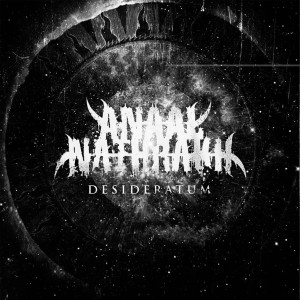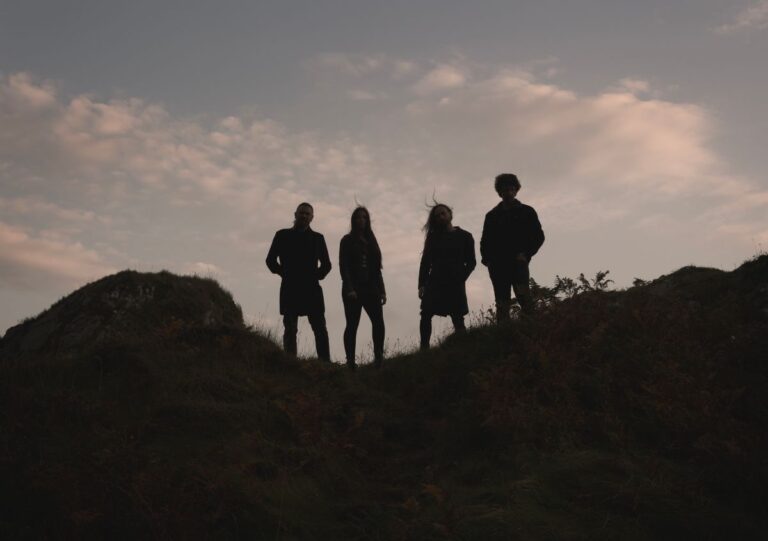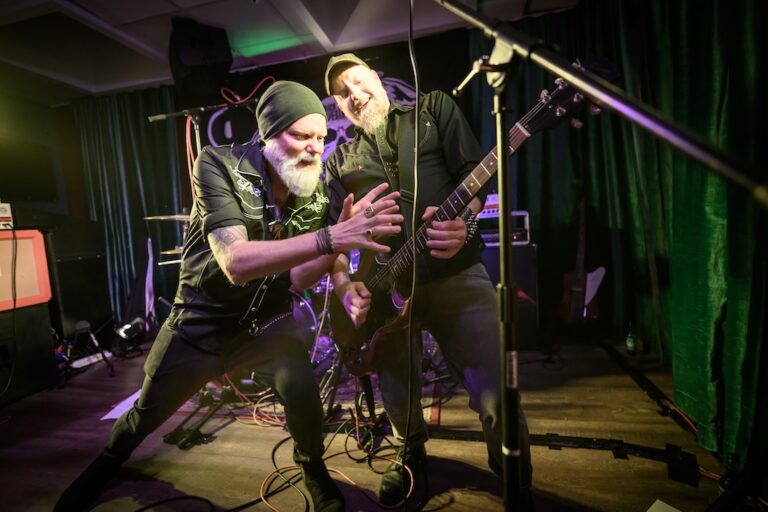Interviewing a band, any band, is actually a fairly intimidating experience. There’s not just the fact that you have to try to make sure your questions are (at least relatively) informed, there’s also the simple fact that, with any long-serving band, you’re going to struggle to ask anything that even approaches being original. The hapless interviewer can, therefore, be faced with apathy, disinterest or even outright hostility if care is not taken over crafting a suitable set of questions and the risks multiply when facing an artist known for being fiercely intelligent and articulate.
Arguably one of metal’s most thought-provoking acts, Anaal Nathrakh are a band that can be enjoyed on myriad levels. As Dave Hunt points out in this very interview, if you want to simply listen to high-pitched screaming and have done then that’s cool with them. However, there is much more to Anaal Nathrakh for those wishing to dig into the lyrics and meaning behind them and this interview captures Dave discussing some of the philosophical elements that underpin the band. With recent release ‘Desideratum’ proving to be one of the year’s most darkly stunning releases, we caught Dave prior to his monumental showing at Damnation and are proud to present this lengthy and in depth interview.

I read an interview with you when you were talking about inhabiting a character on stage and one of the things I was wondering was, with your music like yours which is open to numerous interpretations, whether the interview process is an extension of that act of portrayal?
Right, I understand what you mean. To a certain extent that’s true. But the point I originally made about representation versus presentational acting… it’s a difficult… Representational acting, which I was talking about, is the opposite of a portrayal; it’s an inhabitation, so the two things are in contention. SO yeah, I suppose, an interview is an exercise in channelling whatever it is you represent when you’re performing. But not entirely. It’s a fairly down to earth dialogue, but within certain bounds. For example you’re not going to ask me how my mum is because you’ve never met me before, so there will be a certain direction / theme or idea behind the conversation we have but, other than that, I would try to respond in a fairly authentic way. So yeah, at least with me… maybe for some people, but with me you’re interviewing me, not a character.
The reason I asked is because the interview process in a lot of cases is about the interviewer asking for exposition around the songs; for a clarity of meaning which seems to go against the purpose of Anaal Nathrakh which, to me, is very much about finding the meaning out for yourself, so I was wondering about the interview process and how you approached it because it seems in some cases to fall very much down to “what did you mean by this?” “I meant X,Y and Z” and with Rage against the Machine you might get that sort of response but with you there seems to be a different process to go through to engage with the music without that kind of simplistic approach.
Yeah, yeah, and I’m keen on that kind of idea but it would depend on the quality of the interview to be honest because what you rightly call the expositional portion of an interview, I find that quite irritating. I don’t necessarily feel badly toward anyone who’s questioned me on that, but the idea of going to an interview and saying “please introduce yourself and tell us what you play?” it’s like fucking google it, it’s not hard!!! You’re writing the piece and presumably there’s going to be an introductory paragraph – you can go on Google yourself and stick it in there whereas if someone might say “I interpreted such and such a song or there’s something I read where you said something or other and this is what it made me think and would you say that was…” I’m giving very general ideas of question, but something like that is engaging, you can talk about that, you can have an interesting conversation about it… or, at least, potentially. And I would strongly imagine, although I don’t know – I’m not a journalist – but I would strongly imagine that that’s going to make it more interesting to read. “Tell us your name!” – You’ve read it before haven’t you? It’s formulaic and it isn’t very interesting so I’d rather what you described that it be formulaic because there isn’t a political platform to stand on like if you interviewed Zach De La Rocha or someone who’d probably have several statistics about Bolivian miners that he’d really want to mention, and that’s not even a joke – it’s serious stuff and I don’t knock it, but it’s not the way that I like to approach it, but sometimes you have to. It depends on the interview.
Your lyrical material seems to dig very heavily on a wide variety of literature and particularly philosophy – something I believe you’re very interested in and did an MA in – so that’s another aspect that leaves to the openness of interpretation because you can always approach texts in a number of ways. But, that said, there are a couple of songs that you’ve done which focus on more specific issues, for example there’s one that focuses on the Stanford prison experiment which I thought was a really interesting thing to look at, so with that song and also the album title ‘Hell is empty and all the devils are here’, I was wondering if there was a wider philosophical point – that we can look at evil is an intangible thing that surrounds us rather than evil as a specific, theological construct that is external to humanity.
I certainly wouldn’t see it as external. Absolutely the opposite. Evil is a term that’s used to label the phenomenon. A term used to label a phenomenon is a referent – they make reference to… they pick out a feature of the world. So the idea that there would be something that’s part of human discourse… sorry, I’m using jargon words, but you’ve asked me a complicated question! Something that’s part of human experience generally or sufficiently frequently that we would have a word for it – it strikes me as unlikely that it would come from anywhere outside of human existence. Our definition of the word would probably not match up with it if it was an alien imposition on humanities experience – that’s why we can use a word we all understand to refer to it. So absolutely it’s not to do with theological outside influence. But neither would I say it’s just something that we pick up as ambience; as part of our general environment. I say we generate it. It’s very much the opposite of the theological point of view. We have it in us, it manifests as a result of our reactions and we can refer to it so successfully because we recognise it, mush as we might try to tell ourselves that we don’t. I think we make it. We are it.

Which moves me on to the next question. The nihilist position, and this is an argument I’ve had with my poor mother on a regular basis…
I’ve argued with my mum about it as well!
Whenever we discuss nihilism she sees it as a belief in nothing and that it can be very restrictive, whereas one of the elements of nihilism which I have taken from your music (and maybe it is inferred rather than implied) is that it can be a very liberating philosophy because it’s not so much about giving up and becoming apathetic. It’s about liberating yourself from strictures and therefore aspiring to achieve what you can within the timeframe you have and not assuming that it affects something else.
Personally I would see it and perhaps that’s where the Anaal Nathrakh mind-set would differ slightly from just me. But yeah I would say that possibly the best summation of the way you put it is in Nietzsche – in “thus spoke Zarathustra” – and he’s got the metamorphoses of the soul. In the beginning there’s a camel… but we’ll just forget that part… but you… What he says is you have what he calls the dragon, whose name is ‘Thou-shalt’ and in order to experience freedom or to progress in any way you need the lion and the lion is ‘I Will’. The lion kills the dragon, a bit like rock-paper-scissors, but after that, if you’re left only with the lion and a dead dragon, you’re fucked! You need the child which is called ‘I-create’ and it’s only after this idea of tearing down what you’re supposed to do, whatever the tradition is or the structure is in which you operate. You tear that down and then you can create something. And I see that… nihilism is something that enables post-nihilism. That’s when you can have creation. You have to destroy first. Then you create. The only thing is, many people replace the dragon with a new tradition. That’s why I would say, for example, that much of the way that the market is treated in our society, that’s simply a replacement for a god. It has whims, it reacts in certain ways and if you listen to appropriate bits of serious news broadcasts, they’ll say “the market reacted in such and such a day” as if it’s this entity you have to appease in a certain way and it’s just God again and I think you’re failing in your nihilism if you were to replace things with a reconstituted or reconstructed version of what there was in the first place so thorough nihilism needs to be bleaker, but it’s also hopeful, I would say. It’s a kind of paradoxical. It’s bleak to start with but it needs to be even bleaker and then you can have some good.
SO you need to build form a place of absolute zero, essentially.
Yeah, well that’s one of the songs on the new album – ‘firm foundation of unyielding despair’ – it’s the only way you can build hope for the future. The destructive portion of this programme that I’m suggesting for advancement is more profound and is a bigger thing than I think would initially come into your head. So the destructive part, you almost cannot think of anything coming after it because it has to be much bigger than we realise in the first place. So that’s why I say there’s a slight disconnect between me and Anaal Nathrakh to an extent because I, at least see the idea of trying to build things afterwards whereas Nathrakh’s just about the bleak bit before. And that’s valid, I think, it’s necessary.
It’s interesting that that philosophy is recognized by political theorists as well like Hobbes and Rousseau who tried that kind of experiment of taking us back to a state of nature, or hypothetical state of nature, but both seemed to come to the same conclusion that, if you try to break things down, you end up building the same thing that was already there. For Hobbes it’s creating the strictures that bind people together because humanity can’t be trusted…
Yeah – war against all…
…And for Rousseau it’s about breaking those chains but you’ll still be creating the same substance within and no one seems to be able to think beyond that…
I’d suggest that maybe Nietzsche did. His way of doing things was very, very radical and there were significant problems with the way he went about things. The fact that he was, a twisted version of it to be honest, but the fact that a version of him could be easily misinterpreted as the official philosopher of the Nazi party, it’s not necessarily easy to pick the good bits out, but I think he tried to go a little bit past it to what could come afterwards, but I think both of those guys are probably right. But they’re not right as a conceptually, purely theoretical matter, they’re right in practical terms. We will, pretty much, to my almost certain knowledge, we will tend to recreate bad things. We will tend to resurrect gods to oppress us because those things were projected out from ourselves in the first place. We haven’t changed and I don’t think that it’s likely that we will, but that would be the mode by which we’d do it. Yes we’ll do these things but maybe we can change us and then we can project something better in to the world. I don’t think there’s much hope for it.
To return to the music then, for me, what I’ve taken from Nathrakh more than anything else, is not that there are answers, but that you pose questions and there are ways for listeners, if they want to, to go beyond the music and start exploring that universe and that is where Nathrakh begins, I suppose, in that lyrical sense.
I’d say that’s spot on, yeah. I mean I don’t… Talk to someone whose bright and asks deep questions I’ll end up using long words and talking bollocks for half an hour! But it’s not like you have to be able to do that and buy an album… or probably nowadays download an album… to listen to the music. You don’t have to do that, there’s not going to be a comprehension paper at the end of the record. It’s very much the case that there is more to it and there are hints as to what that might be but I’m not going to tell you to do it. And you can just listen to a load of high pitched screaming noises for a while and turn it off if you want to. But I quite like the idea of it being up to anyone who cares to to look at it for themselves. I’ve said this in other interviews, but when you present everything that you can present, it becomes easily discarded, whereas if you actually have to work for a bit of knowledge, to actually try to understand something then it makes more of it and I would hope that’s what interested people would do but I wouldn’t demand it of them or even, necessarily expect it, but it’s there to be done. That’s the way I would see it, yeah.
The role of the internet has really developed in the last ten years – how much as that… you talked about people working for knowledge and good music, in whatever genre, should be worked at but the internet has taken away a lot of the mystique and the need to work at music… is that something you’ve found?
To a certain extent but I also think there may be a bit of paranoia about it from people of the previous age. Because, yes, it might seem that that is very much the case and I am sure that for some people it is, but it doesn’t have to be. It can – the internet in general can simply make a wider variety of things available to you and people would probably approach them the same way as if they had got them by other means, I don’t think it really changes the character of people, so yeah, I use the internet and stuff constantly. It would be daft not to – it’s there. But rather than listening to an album once and then deleting it, I’ve found things I wouldn’t otherwise have been able to find. One of the bands I’ve found, and again I’ve mentioned them in interviews before, one of my favourite bands I’ve listened to recently is this really obscure Czech black metal band that no one’s heard of before. I don’t know if you’ve heard of Lastfm – it’s reasonably good at judging the relative size of bands and if you go on to Lastfm it has the typical number of listeners and how bands compare and it gives you a fair idea. So we’re on there and if you look up someone like Napalm they’ve got twice the number of people we have and if you look up a small band and so on… and this Czech metal band have 51! No one’s ever heard of them, I’d never heard of them. We come from a certain age – I was too young for the tape trade which is how all of this happened before – I never had that and other than that the only way to find music was the record store in town. So the internet sets you free form that kind of thing – it doesn’t necessarily render everything ephemeral and discardable. I’m just sensitive to the fact that it can so I’d rather push it, slightly, more in one way than the other.
I’ve had this discussion with a friend of mine, and he sees the internet as a “window to the world” but it seems to me that without some kind of affective filter which you have to impose on it using your own judgement, it just becomes a wood and trees scenario and there’s so much out there that p[people just revert to type and go to whatever’s familiar. It seems it doesn’t have the possibilities you’d think it might…
Yeah, it doesn’t have the open actualities but it does have the possibilities, you just have to take it a certain way. Also I’d very much disagree that it’s a window on the world. It’s not, it’s a window on a world. It’s a window on possible, multiple worlds if you dig a bit deeper, but if you just take the internet as it generally presents itself to you, very much it’s a window on a slight, US-centric, very much Western-capitalist view of the world. It’s one world… or maybe two and a half worlds when there’s actually a thousand.
Which, I suppose, is inevitable when so much of the internet readership is based in western societies…
Yeah and the machinery of the internet conspires to only show you those things. You won’t find things on Google now that you would have found ten years ago. You’re stuck with what it… It tries to think… It… some random conglomeration of different elements of programming… there’s no it… but it, in general, as a gestalt entity, tries to figure out what you want to see based on demographic information and gives it to you. There’s loads out there that you won’t generally find, but it is there to be found as a possibility. A superb window on multiple worlds is nonetheless enabled by the technology, you just have to be careful how you consume it.
Musically, there was another interview you did a long time ago with the lead singer from Moss, and you had a really interesting discussion where you talked about the need for journalists to characterise and pigeonhole (and I’m not necessarily excluding myself form this) and you asked the lead singer from Moss whether he consciously listened to other bands and tried to emulate them and he replied that he did not and your comment was that this was a measure of his success as an artist – that he didn’t have to compare himself with everything else and that was what made him unique and original and I wanted to bring that back to you – how aware do you choose to make yourself of music similar to your own?
Well there’s a slight difference there in whether you allow it to become an influence or not. I listen to all sorts of music, really loads and loads of different things. Whether it would be an influence on what we do, no, it just wouldn’t. And, to be honest, most of the stuff I tend to listen to isn’t stuff that sounds like us. There are certain things… I’ve quite enjoyed Portal, lately, and there’s a Deaqthspell Omega I enjoyed not too long ago, but neither of those would be influences. To get to this point of doing it the way we do it in the first place, you’ve kinda served your time. Most new things that I listen to, I’ll be able to give you the three or things they sound like because I’ve heard so much over time. So yeah, in terms of the way in which we do what we do, it’s very much a product only of what’s in our heads but in terms of things we listen to on a day to day basis, it doesn’t have any effect on Nathrakh.
The Midlands, however, seems to have produced a number of drone and doom bands so to what extent is the environment an influence on your sound?
I think none, which might sound a bit weird given that we’re from Birmingham, but in terms of the bands who were actually notable from Birmingham in a way that would relate to us, it’s only Napalm really and that had nothing to do with the fact that they’re from Birmingham. So musically speaking, no, but in terms of environment, possibly because the reason bands sound the way they sound is about far more than musical influences and we had probably similar experiences growing up as the lads from Napalm or whatever. So maybe the place pays a part, but it’s very much by osmosis and not a conscious thing. We had no inkling we wanted to sound like any other band from Birmingham. It might be as a result of a similar environmental influences but we never thought of ourselves as a Birmingham band or even that there was such a thing as a Birmingham band. People will often refer to Birmingham as “the birthplace of heavy metal” or “the place Sabbath came from” but I went to school in Aston, about half a mile away from where Ozzy’s house was, but when I was at school I wouldn’t have gone down that road in the dark because it’s not where Ozzy lives now! Sabbath aren’t part of Birmingham to me – Sabbath are part of MTV and shit you see on TV from LA and they’re not part of my city. And I’mn not trying to be disparaging – I’m not trying to be nasty about them, but where I grew up had very little to do with them but, nonetheless, certain cultural differences will always be the same for anyone form a place like that. Certainly most cities north of Milton Keynes have the common factor that they’re old manufacturing bases.
Which is why all the progressive bands are from the south!
Possibly – yeah – because they don’t have to worry about earning money or working for a living! Not really!

There is always that desire to pigeonhole, but listening to Nathrakh I don’t see that the music fits into any one musical pattern, but in terms of presentation there does seem to be a very black and death metal aesthetic in the way the logo and artwork are presented and I was wondering how much of it was a conscious effort on the part of the band and/or the label in terms of how to… package the music to the wider world.
In terms of the artwork we do it all ourselves but it’s not really that we would try to fit into a pre-existing style or anything like that. My favourite cover image that we’ve had in our albums is probably from ‘passion’. But the reason that looked the way it did was because we went to our museum in the Czech Republic and found a piece that looked like that so Mick did a version of this thing we found impressive to look at. So it’s not like we’re trying to belong to any aesthetic pigeonhole. We like certain things and these appear as themes in our music and so we’ll make art which reflects those things but whether it matches up with other things, we don’t know to be honest, we hadn’t really thought about it. I’m more concerned with whether I like the picture than whether it’s got the ‘right’ thing in it. But maybe we’re subconsciously brainwashed to stereotype ourselves!!



